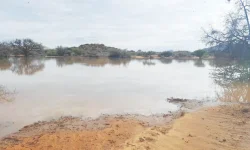The rains in Namibia have brought mixed feelings for farmers. Some are thankful for the much-needed water, while others worry it may be too little, too late.
Hendrik Steenkamp is a farmer in the //Kharas region. He and his family suffered through two long droughts. It caused them trauma and poverty. But when the rains finally came, Steenkamp felt God was telling him to rest and trust. In just a week, the drought turned into a green valley. The trees and grass came back to life.
Jostofine Garises lives in Koës, also in //Kharas. She says the rain gave her new hope. It provided food for the animals and water for the plants, which was needed as people had been struggling with water shortages.
However, many farmers have lost a lot over the past eight years. Councillor Johannes Goeieman says people who had hundreds of animals now have less than 30. They hope the rain will help them slowly rebuild.
In the northern regions, farmers are relieved, too. Natangwe Sheya from Oshana says the rain is bringing back grazing land. His community still feels the effects of the drought, though. Their grain silos are empty, and they lack food. They pray for a good harvest to get back on their feet.
Councillor Lebeus Shipindo wants farmers to work hard. He says it's time to get their hands dirty and plant their fields. The rains seem promising so far.
However, not all areas have had equal rainfall. Lotokeni Aipinge from Outapi says her area is still quite dry. Some farmers haven't been able to plant yet. Many families continue to face hunger after last year's failed harvests.
Nonetheless, farming is in full swing where the rains have been sufficient. Steven Mungongi reports that nearly all small-scale farmers are busy in their fields in parts of Kavango West.
The drought has been hard on farmers like Rusuvero Kaitjirokere from Omaheke. He says they have never had enough rain in the last seven years. Even when it rains, he still has to bring drought feed to his cattle.
Kaitjirokere wants the government to understand the struggles farmers face. He says the economy depends on cattle, too, and it pays for everything from children's needs to school fees. He pleads for the president to reconsider the situation in Omaheke.
The rains have brought a glimmer of hope to Namibia's parched land and weary farmers. But the long road to recovery has only just begun. The fate of many families still hangs in the balance, waiting to see what the rest of the season will bring.
Hendrik Steenkamp is a farmer in the //Kharas region. He and his family suffered through two long droughts. It caused them trauma and poverty. But when the rains finally came, Steenkamp felt God was telling him to rest and trust. In just a week, the drought turned into a green valley. The trees and grass came back to life.
Jostofine Garises lives in Koës, also in //Kharas. She says the rain gave her new hope. It provided food for the animals and water for the plants, which was needed as people had been struggling with water shortages.
However, many farmers have lost a lot over the past eight years. Councillor Johannes Goeieman says people who had hundreds of animals now have less than 30. They hope the rain will help them slowly rebuild.
In the northern regions, farmers are relieved, too. Natangwe Sheya from Oshana says the rain is bringing back grazing land. His community still feels the effects of the drought, though. Their grain silos are empty, and they lack food. They pray for a good harvest to get back on their feet.
Councillor Lebeus Shipindo wants farmers to work hard. He says it's time to get their hands dirty and plant their fields. The rains seem promising so far.
However, not all areas have had equal rainfall. Lotokeni Aipinge from Outapi says her area is still quite dry. Some farmers haven't been able to plant yet. Many families continue to face hunger after last year's failed harvests.
Nonetheless, farming is in full swing where the rains have been sufficient. Steven Mungongi reports that nearly all small-scale farmers are busy in their fields in parts of Kavango West.
The drought has been hard on farmers like Rusuvero Kaitjirokere from Omaheke. He says they have never had enough rain in the last seven years. Even when it rains, he still has to bring drought feed to his cattle.
Kaitjirokere wants the government to understand the struggles farmers face. He says the economy depends on cattle, too, and it pays for everything from children's needs to school fees. He pleads for the president to reconsider the situation in Omaheke.
The rains have brought a glimmer of hope to Namibia's parched land and weary farmers. But the long road to recovery has only just begun. The fate of many families still hangs in the balance, waiting to see what the rest of the season will bring.












